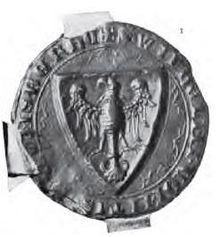Wilhelm (Arnsberg)
Wilhelm von Arnsberg (* around 1277 ; † 1338 ) was Count von Arnsberg and ruled from 1313 to 1338.
Family and origin
Wilhelm von Arnsberg was the son of Count Ludwig and his wife Pironette von Jülich, daughter of Count Wilhelm IV von Jülich .
Wilhelm himself was married to a relative Beatrix von Cuyk-Rietberg, a daughter of Count Konrad II von Rietberg . During the course of their marriage, the couple had seven offspring. Gottfried succeeded his father. The son Wilhelm became provost of the canons of Meschede . Konrad was canon of St. Peter in Osnabrück . Mechthild married Johann III. Count of Oldenburg. Adelheid was a canon in Cologne . Jutta became abbess in Fröndenberg . Piornette was abbess of St. Ursula in Cologne. An illegitimate son of the count was Walram canon and provost in Mariengraden in Cologne and dean in Zülpich .
Live and act
Wilhelm succeeded his father in 1313. Although his position was largely safe, the numerous descendants of the old count made a hereditary comparison necessary, which Gerhard von Jülich, an uncle of Wilhelm, brokered. After that, Wilhelm as count was recognized by the other beneficiaries as the successor to Ludwig and the exclusive ruler of the county. Immediately after this agreement, the new count held a general feudal day . The protocol received gives some insights into the ownership of the count's house. Thereafter, Wilhelm awarded a total of 261 fiefs. He could not, of course, dispose of these directly, since they were almost exclusively inherited.
Under Count Wilhelm, the territory was once again involved in larger political contexts. In contrast to the Archbishop of Cologne, Wilhelm did not support Frederick of Austria, but Ludwig of Bavaria after the death of Emperor Henry VII . He prevailed as Ludwig IV in this conflict. At that time Wilhelm was often to be found in the emperor's court camp.
In gratitude, Count Wilhelm received an imperial fief from the Kaiser: The Bailiwick of Soest , ducal rights ( ducatus ) within the boundaries of his county. In addition, he received the so-called right of action . This gave him the right to carry the imperial flag if the emperor or the archbishop of Cologne in his capacity as Duke of Westphalia ( summus dux ) were to wage war in the Westphalia area. Usually this right was reserved for the Duke of Swabia . He also received forests and customs revenue at Neheim. The ducal rights were of course of little practical importance in view of Cologne's factual superiority.
At an advanced age, Count Wilhelm, like his ancestor Gottfried I, went on a campaign to the east. Like other knights and counts, he accepted the invitation of Johann von Luxemburg. This was allied with the Teutonic Order in battle with the Polish King Władysław I. Ellenlang and the pagan Lithuanians . In the course of this enterprise, Wilhelm founded the city of Arnsburg on the island of Oesel in 1337 .
Wilhelm died in 1338 after almost twenty-five years of reign. He had appointed his brother Gottfried , Bishop of Osnabrück , to be his executor .
Individual evidence
- ^ Genealogical table in: Michael Gosmann: The Counts of Arnsberg and their county. On the way to sovereignty (1180–1371). In: Harm Klueting (Hrsg.): The Duchy of Westphalia: The Electorate of Cologne Westphalia from the beginnings of Cologne rule in southern Westphalia to secularization in 1803. Münster 2009 p. 173
literature
- Karl Féaux de Lacroix : History of Arnsberg. HR Stein-Verlag, Arnsberg 1895, pp. 48-51 (reprint: Stein, Werl 1983, ISBN 3-920980-05-0 ).
| personal data | |
|---|---|
| SURNAME | Wilhelm |
| ALTERNATIVE NAMES | Wilhelm von Arnsberg (full name) |
| BRIEF DESCRIPTION | Count of Arnsberg (1313-1338) |
| DATE OF BIRTH | around 1277 |
| DATE OF DEATH | 1338 |
